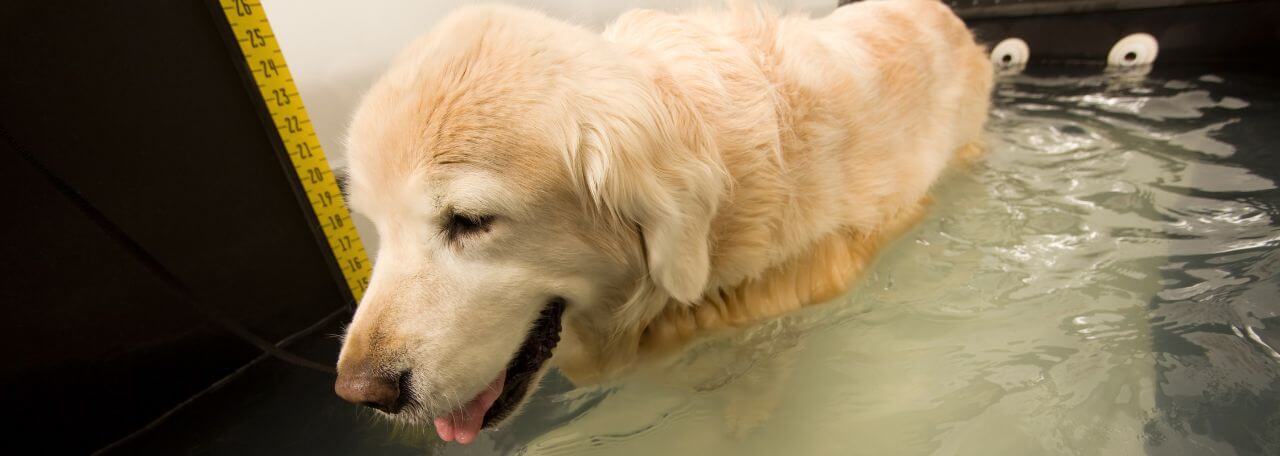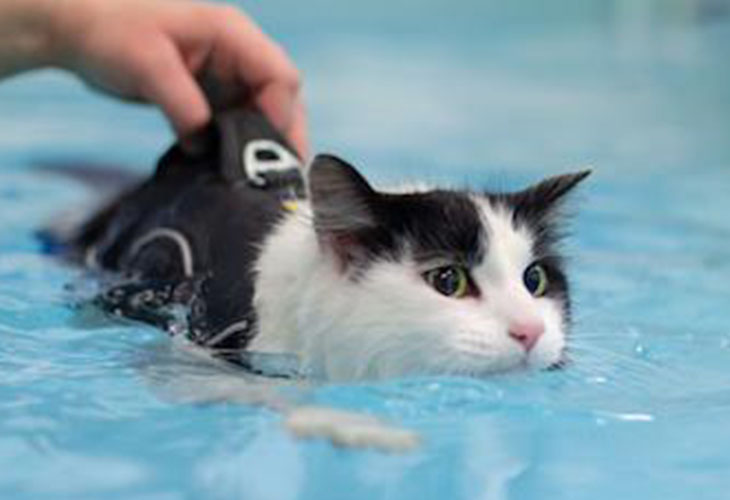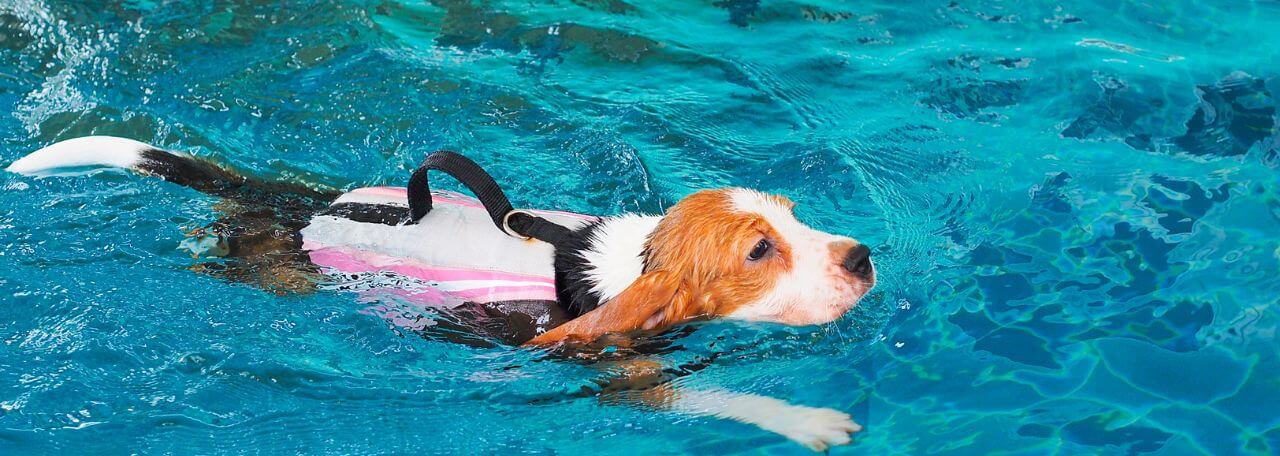Canine hydrotherapy: an overview
Dogs love to swim, it’s great exercise and lots of fun! Water can also be a great treatment option. Most pet owners come across small animal hydrotherapy when it is recommended as a treatment for their four-legged companion. This can be after an injury, or because your pet is being treated for a chronic condition, or even to help your pet lose weight.
Essentially, canine hydrotherapy is a form of therapeutic exercise that takes place in a warm water pool, sometimes using an underwater treadmill. It is normally suggested as treatment for chronic conditions, preparation for or recovery after surgery, and for general fitness.
Water allows the dog to exercise in a buoyant environment and can provide several health benefits including:
- Increased circulation to muscle
- Increased joint flexibility
- Reduced joint pain

Hydrotherapy in canine physical rehab
Hydrotherapy is being offered more and more for dogs’ physical rehab needs. As it’s low impact, it is a great way for our furry friends to gradually improve their strength and conditioning after surgery or sustaining an injury.
Hydrotherapy is also an excellent way to help animals lose weight. Moving in water takes pressure of the joints and there is a lower risk of injury due to the low impact nature of exercising in water. Plus, spending time exercising and having fun in water is a great stress-busting activity! Hydrotherapy can help improve more than just physical issues - it can help improve the general welfare of our pets too.
How hydrotherapy can benefit animals
The therapeutic benefits of emersion in water are well known for people. Indeed, it has been prescribed since ancient times for a range of maladies. It’s the same for our four-legged friends. Water is healing and working with a trained professional can ensure that aches and pains decrease, and mobility is regained.
Hydrotherapy is not only beneficial to dogs, but many other small animals benefit from hydrotherapy sessions too.

There are examples like that of the pygmy goat who fell off a play frame when she was only 10 weeks old. She suffered a soft tissue injury to her forelimb which prevented her from bearing weight on it. She started animal hydrotherapy to increase her range of movements and reduce inflammation. Being able to weight bear more led to an increase in her muscle mass (there had been significant atrophy through disuse). Treatment led to a full recovery!
Benefits of hydrotherapy for animals include:
- Increased motion range in joints
- Relief of pain, stiffness and swelling
- Improved circulation
- Increased tissue healing
- Muscle maintenance and strengthening
- Alleviating muscle spasm
- Cardiovascular fitness
- Increased speed of recovery
Veterinary Hydrotherapy
Vets are increasingly referring small animals to qualified Small Animal Hydrotherapists to create and carry out a suitable treatment plan.
According to the Canine Hydrotherapy Association,
“Hydrotherapy in conjunction with veterinary treatment can significantly improve the quality and rate of healing following surgery or traumatic injury. Controlled swimming helps to improve cardiovascular stamina, muscle tone, range of movement and is particularly helpful in aiding recovery from injury or surgery whilst also improving general fitness”
Conditions that benefit from Hydrotherapy include:
- Cruciate ligament problems
- Sprains and Breaks
- Hip Dysplasia
- Spinal Injuries and paralysis
- Muscle maintenance and strengthening
- Post-operative muscle regeneration and maintenance
- Osteochondritis Dissecans (OCD)
- Obesity and weight control
Physical Rehabilitation for Veterinary Practices

Water is an optimal environment for rehabilitation. The buoyancy in water allows for more movement whilst also ensuring protection for joints and muscles. Animal patients who receive physical rehabilitation in water have shown a faster return to their normal function. Animal hydrotherapy is well known to provide pain relief. It also provides improved health for animals suffering from neurologic, orthopaedic, and chronic diseases.
Vets refer a wide range of animals to rehabilitation programmes including:
- Those recovering from injuries or surgery
- Overweight pets
- Senior pets with chronic, debilitating conditions
- Those with agility issues
- Service dogs
Physical rehabilitation with hydrotherapy is well regarded and can be an invaluable addition to a veterinary practice. A further incentive is the relatively low overhead costs involved.
Hydrotherapy Courses
Some students first come across small animal hydrotherapy when their pet has benefited from treatment - they become so interested in the process that they decide to train to become a qualified Small Animal Hydrotherapist themselves! Other students may have worked with dogs in other capacities and decide to widen their skill set.
All Small Animal Hydrotherapists must be qualified to practice. This is because they are providing medical and technical treatment. Animal Hydrotherapy is an exciting field of work to join and is immensely rewarding. Animal courses direct offer a range of small animal hydrotherapy Ofqual regulated qualifications that combine high-quality theory and crucial practical training.
The practical taster days are well regarded and will give you the chance to find out more before committing to a full course. During the day, you will get the chance to:
- Gain hands-on experience in both the pool and water treadmill
- Gain an understanding of the water management/treatments that are carried out daily to ensure that the water is both safe and hygienic for clients and staff
- Look at case studies and conditions that are often referred over for hydrotherapy

Maybe you’re already a qualified Vet, Vet Nurse or Animal Physiotherapist and just require a top up in Animal Hydrotherapy. Or perhaps you would like to learn more about aquatic treadmill therapy.
O the other hand you may want to start from scratch and train to become a qualified Animal Hydrotherapist. Whatever your training needs, Animal Courses Direct have a range of qualifications to suit you including:
- Level 3 Diploma in Small Animal Hydrotherapy
- Level 3 Diploma in Small Animal Hydrotherapy (Top up for Veterinary Surgeons and Veterinary Nurses)
- Level 3 Diploma in Small Animal Hydrotherapy (Top up for Veterinary Physiotherapists)
- Level 3 Award in Aquatic Treadmill Therapy for Small Animals
- Level 3 Award in Advanced Aquatic Treadmill Therapy for Small Animals
- Level 3 Certificate in Small Animal Hydrotherapy
Once qualified you can look for employment as an Animal Hydrotherapist (register with our Job Board for the latest vacancies or contact Animal Hydrotherapy centres near where you live with your CV). Or, alternatively, you can set up your own Animal Hydrotherapy business!
Level 3 Certificate in Small Animal Hydrotherapy
If you’re set on working with animals in a hydrotherapy environment, then this certificate is the perfect starting point.
During the course, you will learn about the hydrotherapy process in relation to small animals such as:
- Dogs
- Cats
- Rabbits
This comprehensive 10-unit course covers:
- Introduction to Hydrotherapy
- Small Animal Behaviour
- Small Animal Assessment for Hydrotherapy
- Hydrotherapy and related conditions
- Maintenance of equipment and water balance
- Professional practice management
- Practical administration of hydrotherapy
- Small Animal First Aid
- Anatomy and Physiology of small animals
- Gait analysis and biomechanics
Once you’ve completed the course, you can choose to take the next steps and progress onto further related education and training - such as Hydrotherapy Treadmill Therapy and Advanced Treadmill Therapy. There is also the option to continue onto the Level 4 Diploma in Small Animal Hydrotherapy and then on to Levels 5 and 6 Veterinary Physiotherapy (coming soon).

Once you have completed your qualification in Small Animal Hydrotherapy you can apply for a membership at the International Association of Animal Therapists (IAAT) This membership is available to all animal therapists, veterinary surgeons and nurses and students.
Also, if you adore animals, you can keep track of all upcoming animal awareness days and events with our FREE calendar! Download it here.
















